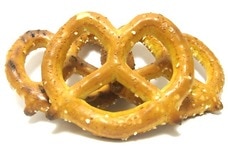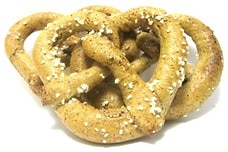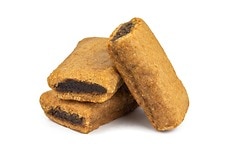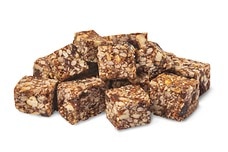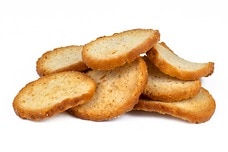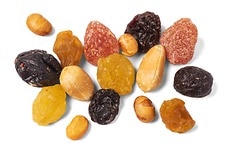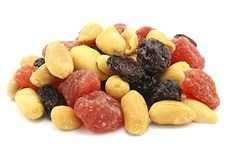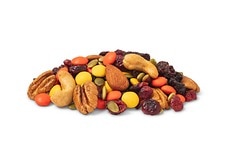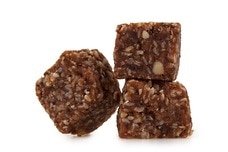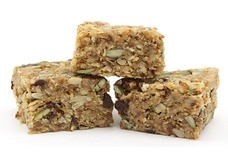Pre- and Post-Workout Snacks
Personal trainers constantly hear the refrain: “I just never know what to eat before a workout!” Questions about what to eat to optimize a workout are not uncommon, and may be of critical importance to the success of your fitness goals. Your body has very particular needs that depend on your age, sex, fitness level, and training goals. It may take some trial and error to find the best meals to fit your pre- and post-workout needs but practice makes perfect and we’re certain this information will help you identify the perfect portions for you.
What Should I Look for on the Nutrition Labels of My Pre- and Post-Workout Snacks?
The United States Department of Agriculture [USDA] (2016) explains that our bodies require three different types of macronutrients: carbohydrates, fats, and proteins. Carbohydrates come in the form of sugars, starches, and fibers, which differ in their complexity and molecular length. In general, however, carbohydrates can be broken down into glucose molecules, which the body relies on as its primary source of energy.
Fats are another building block of nutrition. Although fats have gotten a bad rap, they are an important source of energy for the body. During a workout, the body will quickly use up all of the available glucose created from the digestion of carbohydrates. If carbs aren’t readily available, the body can break into its stores of fat to get the energy it needs (USDA 2016).
Finally, proteins are made up of chains of molecular building blocks called amino acids. These amino acids can be used to build parts of cells, create enzymes, or help cells signal to one another. Your body only uses proteins for fuel if carbohydrates and fats are unavailable.
Each gram of fat contains 9 calories, while each gram of carbohydrates or proteins contains just 4 calories. If you are trying to lose weight, it is necessary to burn more calories than you take in each day. Thus, you must be mindful of your patterns of consumption when it comes to balancing your intake of carbohydrates, fats, and proteins (USDA 2016).
Clarify Your Training Goals to Inform Your Nutritional Needs
There is no single answer to the question, “What is the perfect pre-workout food?” The answer depends completely on your training goals; for example, an Olympic powerlifter needs a much different post-workout snack than someone simply trying to lose some weight.
When determining your nutritional needs, think about your overall training goals. Are you hoping to lose weight and eliminate excess body fat, focusing on building your endurance for a long race, or engaging in frequent weight lifting to build muscle mass? Each of these goals will result in vastly different nutritional needs.
Pre-Workout Nutrition Requirements
The American Heart Association (2015) advises that before your workout, you should provide your body with nutrients that it can easily convert into energy. This typically means carbohydrates. Approximately two hours before you hit the gym, eat one or two servings of complex carbohydrates. A good pre-workout meal may include whole-wheat toast, low-fat yogurt, brown rice, or whole-grain cereals. Two hours gives your body time to digest these complex carbohydrates into easy-to-use glucose molecules.
If you’re running short on time, choose a pre-workout snack that is an easily digestible source of carbohydrates. A piece of fruit typically does the trick, offering a natural and fibrous source of simple sugars. Wash it down with a full glass of water to start your workout with proper hydration.
Do You Need to Eat During a Workout?
Some athletes fuel their bodies during a workout, while others opt not to do so. Again, the optimal decision depends on your training goals. According to the American Heart Association (2015), there is no need to fuel mid-workout if you’re exercising for less than 60 minutes. The same rule applies to weight lifting exercises designed to increase muscle mass. For these sessions, your pre workout snack will suffice to provide energy, while post workout nutrition becomes more critical.
For people training for aerobic endurance, it is a smart idea to give your body a small amount of fuel if you are training for longer than one hour. When engaging in longer workouts at a high intensity, eat 50 to 100 calories each half hour. This might include some raisins or dried fruit, a banana, or a small energy bar.
Even more important than food is ensuring that your body gets enough fluid during a workout. Drink water frequently during aerobic exercise, taking small sips every few minutes. This ensures that your tissues will work properly during and after your workout. For longer workouts, consider grabbing an energy drink or a gel fuel pouch to replace the electrolytes you are losing through sweat.
Post-Workout Nutrition for Recovery
After you finish your workout, your body enters recovery mode. This means that your tissues begin to rebuild and replenish themselves. Many athletes wonder what to eat after a workout to facilitate this recovery process. In fact, creating the perfect post-workout snack is critical to reaching your goal, whether it entails losing weight, boosting endurance, or building muscle mass.
Your body has two major nutritional needs during recovery: carbohydrates and proteins. In the 20 to 60 minutes following your workout, carbohydrates provide much-needed energy to muscle fibers. Proteins, on the other hand, are essential building blocks to repair muscle tissue that is torn during a workout. This tissue rebuilding process goes on for several hours following a workout, but your body benefits most if you consume protein within 30 minutes of ending your exercise routine (American Heart Association, 2015).
The relative ratio of carbohydrates to proteins depends on your training goals. If you are focusing on aerobic exercise to build cardiovascular endurance, a 1:1 ratio of proteins to carbohydrates is fine. If your goal is to build muscle mass, you will want a snack that is closer to a 2:1 ratio of proteins to carbohydrates. The extra protein is needed to provide you with the amino acids necessary to create muscle tissue.
Keep focused on the calories in your post-workout nutrition, particularly if you are trying to lose weight. Many energy bars are high in sugar and calories, which can be detrimental to your fitness goals. Instead, make yourself a shake using protein powder, which also rehydrates your body. Alternatively, eat a banana with peanut butter, tuna on whole wheat bread, hummus with whole wheat pita bread, or a snack mix with nuts and dried fruits (Whitmore, 2001).
Recommended Recipes for Pre- and Post-Workout Meals and Snacks
Discover delicious dishes to accommodate your aerobic and muscular workouts with these recipes that create collations relevant to your niche nutritional needs. For heartier meals to accommodate your post-workout needs, be sure to also check out our article on post-workout meals.
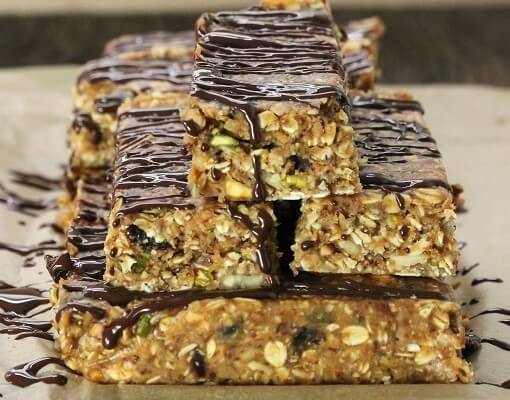
No-Bake Granola Bars Recipe {gluten-free, vegan}
Pre-workout: Create a collection of these wholesome snacks at the beginning of your week to have a quick and easy snack readily available. These bars contain plenty of carbohydrates with a blend of abundant fiber, a satisfactory supply of simple sugars, and a hearty combo of complex carbs and protein to boot!
Ingredients: Gluten-free rolled oats, peanut butter, dried tart cherries, pistachios, flaxseed meal, walnuts, pumpkin seeds, sunflower seeds, agave syrup. unsweetened applesauce, melted cacao nibs or dark chocolate.
Total Time: 15 minutes
| Yield: 8 - 10 servings
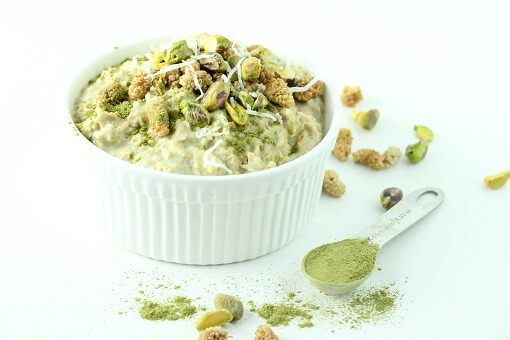
Moringa Oatmeal Recipe
Pre-workout: If you prefer a well-planned meal before each morning workout session then this moringa oatmeal provides the perfect plate. Abundant in complex carbs, fiber, sugars and protein - this dish can act as an idyllic snack before any workout.
Ingredients: Gluten-free rolled oats, almond milk, agave or maple syrup, vanilla extract, moringa powder, pistachios, dried mulberries, unsweetened shredded coconut, chia seeds.
Total Time: 10 minutes
| Yield: 4 servings
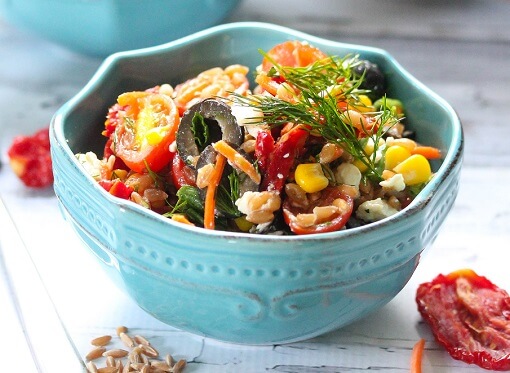
Farro Vegetable Salad Recipe
Pre-workout: This Mediterranean side can be prepared well-before a meal for a quick bite to eat, or made fresh to supply you with the nutrients you need. Each bite is packed with an abundance of protein and complex carbohydrates to power your exercise session.
Ingredients: Organic farro, sun dried tomatoes, frozen corn (thawed), scallions, black olives, feta cheese, cherry tomatoes, shredded carrots, salt, fresh dill, fresh mint, extra virgin olive oil, balsamic vinegar.
Total Time: 1 hour
| Yield: 6 servings
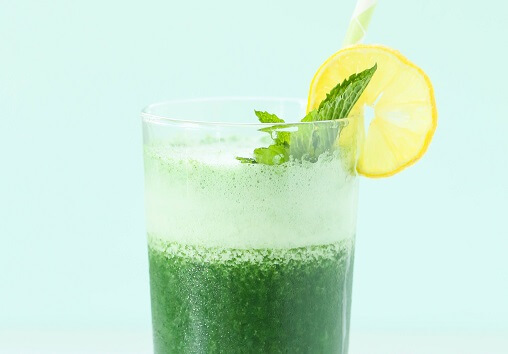
Spirulina Smoothie Recipe
Post-workout: This sweet treat supplies a smooth sensation that is simply delightful. Using the potent power of spirulina powder, the drink also offers an abundance of vitamins and replenishing nutrients to aid recovery from an intense aerobic session.
Ingredients: Spirulina, banana, fresh spinach, apple juice, crushed ice, lemon juice.
Total Time: 2 minutes
| Yield: 2 smoothies
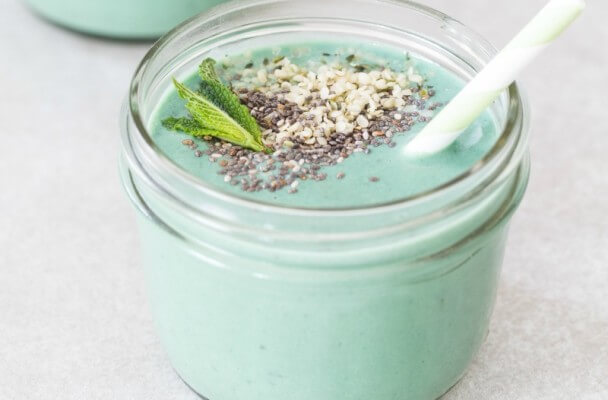
Protein-Packed Detox Smoothie Recipe {vegan}
Post-workout: Ideal for rebuilding muscles while rehydrating, this blended beverage is packed with protein and most of its carbs come from much needed fiber. The drink is also low in calories to help you maintain weight should you supplement your protein intake with a handful of healthful almonds.
Ingredients: Almond milk, frozen banana, spirulina, hemp protein powder (optional), fresh mint, chia seeds, hemp hearts.
Total Time: 5 minutes
| Yield: 2 servings
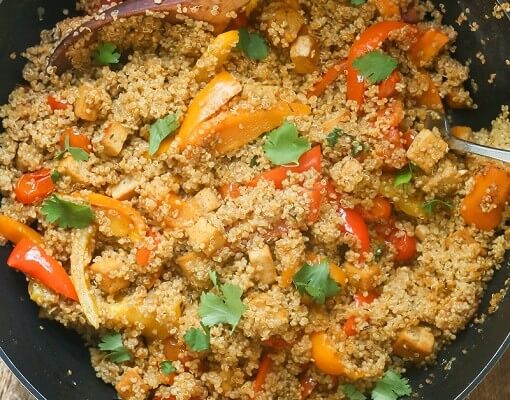
Veggie Quinoa Casserole Recipe {gluten-free, vegan}
Post-workout: For a more substantive meal should your workout precede dinnertime, this delicious dish offers complex carbohydrates and needed electrolytes to aid your recovery. The potential benefits for muscular workouts can also be increased by substituting tofu with your favorite lean protein.
Ingredients: Quinoa, extra firm tofu, bell peppers, cherry tomatoes, olive oil, paprika, cumin, oregano, thyme, salt.
Total Time: 35 minutes
| Yield: 4 - 5 servings
Recommended Pre- and Post-Workout Snacks
A winning combination includes foods that deliver carbohydrates and protein. The carbohydrates replenish glycogen stores – glycogen is a form of carbohydrates that is stored in the muscles and liver to provide energy during workouts. Remember that whatever you choose to snack on, it’s essential to drink some water, too!
Pre-Workout Snacks
Post-Workout Snacks
Healthy Eating
- Healthy Highlights
- 5 Uses for Cacao Powder
- 5 Ways to Eat Farro
- 6 Best Gluten-Free Foods
- Alcohol and the Body
- Almond Flour Recipes
- Anti-Aging Superfoods
- Beat the Afternoon Slump
- Benefits of a Plant-Based Diet
- Benefits of Baobab
- Benefits of Cashews
- Benefits of Coconut Oil for Hair
- Benefits of Coconuts
- Benefits of Dates
- Benefits of Fenugreek
- Benefits of Garcinia Cambogia
- Benefits of Goji Berries
- Benefits of Kale Chips
- Benefits of Monk Fruit Sweetener
- Benefits of Peanuts
- Benefits of Pecans
- Benefits of Pistachios
- Benefits of Pumpkin Seeds
- Benefits of Spelt Flour
- Benefits of Steel Cut Oats
- Benefits of Sunflower Seeds
- Benefits of Tiger Nuts
- Benefits of Turmeric
- Benefits of Walnuts
- Benefits of Wheatgrass
- Best Food Fads
- Cacao vs Cocoa
- Caffeine-Free Energy Foods
- Chocolate That's Good for You
- Diet vs. Exercise
- Fat Burning Foods
- Food Myths Debunked
- Foods for Bone Density
- Foods for Colon Health
- Foods for Healthy Hair
- Foods for Healthy Skin
- Foods to Help Sleep
- Foods to Reduce Stress
- Green Tea Benefits
- Healthy Baking Flours
- Heart Healthy Habits
- High Protein Health Risks
- How to Boost Your Metabolism
- How to Lose Weight While Aging
- How to Throw a Vegan BBQ
- Kaniwa vs Quinoa
- Little Health Foods
- Low-Carb: Fad or Friend?
- Making Healthier Desserts
- Mediterranean Diet Meal Plan
- Natural Beauty Products
- Nuts for Weight Loss
- Preparing Vegan Meals
- Preventing Muscle Degeneration
- Rare Superfoods
- Reduce Sugar Intake
- Save Time By Going Vegan
- Smarter Snack Swaps
- Smoothie Ingredients
- Soy Protein vs Whey Protein
- Starting a Plant-Based Diet
- Steel Cut vs Rolled Oats
- Sugar Substitutes
- Vegan Proteins
- Vegan Substitutions for Fall Recipes
- Why Go Vegan
- Healthy Meals
- Healthy Recipes
- Sports Nutrition
- Nutrition and Special Diets
- 21 Day Fix
- 5 Popular Diet Similarities
- Alkaline Diet
- Anti-Inflammatory Diet
- Calorie Counting
- Carb Cycling Diet
- Celiac Disease
- Cholesterol
- Clean Eating
- Crohn's Disease
- DASH Diet
- Detox Diet
- Diabetes
- Diabetes Diet
- Diet Pill Dangers
- Fat Burning Foods
- Gluten-free Diet
- Glycemic Index
- Heart Health
- High Blood Pressure Diet
- High Fiber Foods
- How to Eat Healthy
- How to Lower Blood Pressure
- Hypertension
- IBS Diet
- Ketogenic Diet
- Liquid Diet
- Low GI Foods
- Low-Carb Diet and Foods
- Low-Fat High-Carb Diet
- Mediterranean Diet
- Mediterranean Diet Foods
- Military Diet
- Nutrition Labels Explained
- Paleo Diet
- Raw Food Diet
- Superfoods
- Sustainable Weight Loss
- Thrive Diet
- Vegan Diet
- Vegetarian Diet
- Weight Loss Shakes
- Whole30
- Vitamins, Minerals & Nutrients

